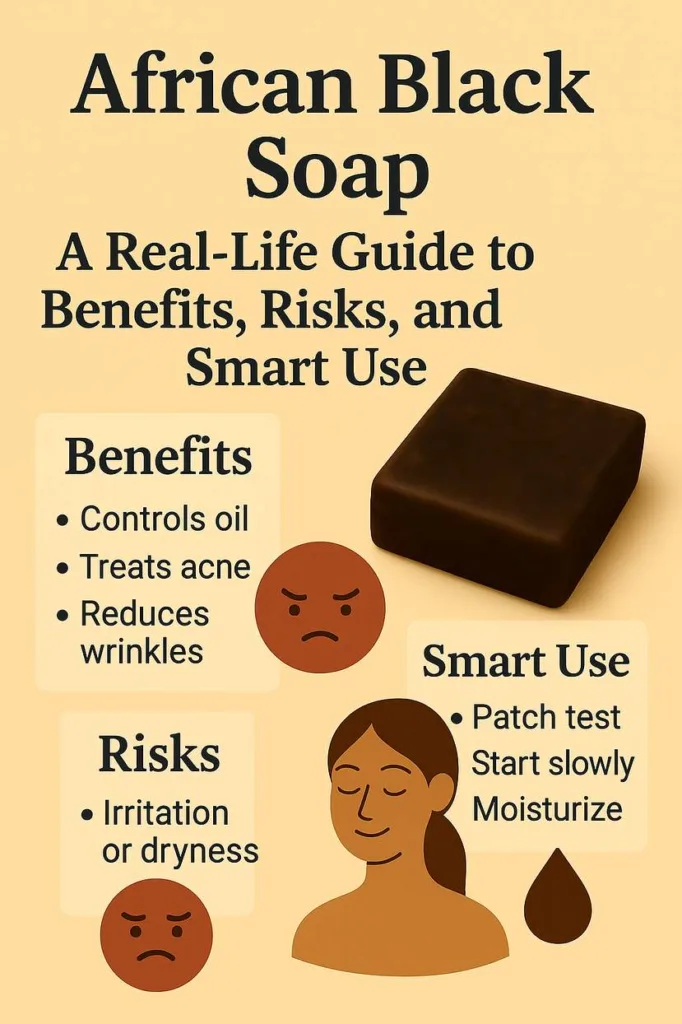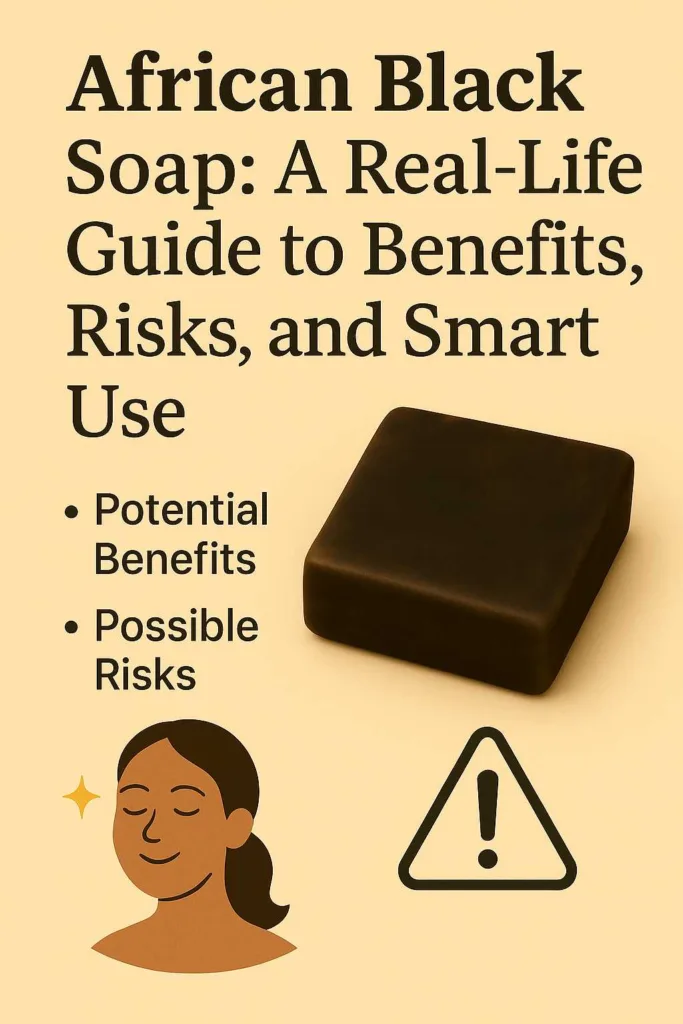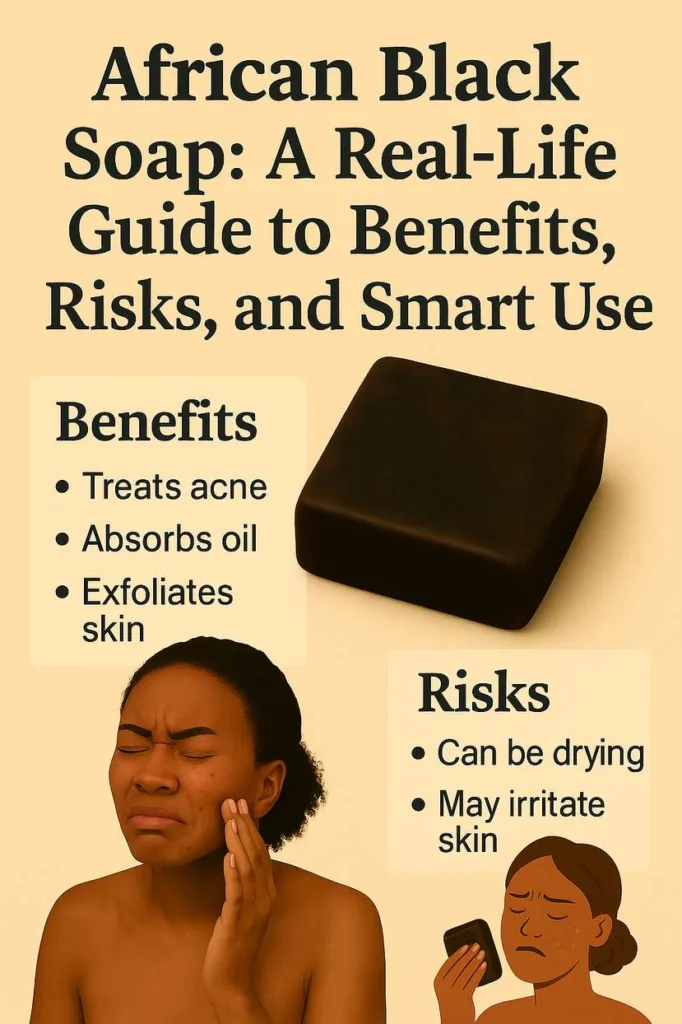What Is African Black Soap?
Origins: West Africa, tradition, and community craftsmanship
African black soap, known as “ose dudu” in Yoruba or “alata samina” in Ghana, represents centuries of West African skincare wisdom. This traditional cleanser originated in countries like Ghana, Nigeria, and Togo, where women’s cooperatives have passed down soap-making techniques through generations. Unlike mass-produced soaps, authentic African black soap supports community economies and preserves cultural heritage.

Core ingredients (plantain skins, cocoa pod ash, shea butter, oils) and how it’s made
The magic lies in its simple yet powerful ingredients. Plantain peels and cocoa pods are sun-dried, then burned to create potash-rich ash. This ash is combined with water to form lye, which is then mixed with palm kernel oil, coconut oil, and shea butter. The mixture is hand-stirred for hours until it reaches the perfect consistency. This labor-intensive process creates a soap that’s naturally glycerin-rich and incredibly nourishing.
Raw vs. refined vs. liquid African black soap
Raw African black soap appears dark brown to black with an irregular, crumbly texture. Refined versions are smoother and may contain additional ingredients. Liquid versions often include synthetic additives and preservatives, diluting the traditional benefits. For authenticity and effectiveness, stick with raw, unprocessed bars.
My First Impressions (Texture, Scent, and Feel)
How African black soap felt on my face the first week
My first encounter with African black soap was humbling. The earthy, slightly smoky scent was unlike anything in my skincare routine. The soap felt surprisingly gentle despite its rustic appearance, creating a creamy lather that didn’t strip my skin. However, I noticed my face felt tighter than usual after cleansing, signaling I needed to adjust my approach.
The “tightness test” and what it told me about my moisture barrier
That post-cleanse tightness was my skin’s way of communicating. African black soap is naturally alkaline (pH 9-10), which can temporarily disrupt your skin’s acid mantle. This isn’t necessarily bad, but it taught me the importance of following up with a balancing toner and moisturizer immediately after use.
Benefits of African Black Soap (By Skin/Scalp Type)
Oily and acne-prone skin: why it may help
For oily skin, African black soap can be a game-changer. Its natural saponins effectively remove excess oil without harsh chemicals. The plantain extract provides gentle antibacterial properties, while the soap’s ability to deep-clean pores may help prevent breakouts. However, consistency is key—sporadic use won’t deliver results.
Dry or sensitive skin: when to go slow
If you have dry or sensitive skin, approach African black soap with caution. Start with once-weekly use and always dilute it by creating a lather in your hands first. The shea butter content provides some moisturizing benefits, but you’ll need to be diligent about follow-up hydration.
Body care: keratosis pilaris, back acne
African black soap excels at body care. Its exfoliating properties can help smooth keratosis pilaris (those bumpy arms), while its deep-cleansing action tackles back acne effectively. Use it 2-3 times weekly on problem areas, always moisturizing afterward.
Scalp and hair: clarifying—but don’t skip conditioner
As a clarifying treatment, African black soap removes product buildup and excess oil from the scalp. However, it can be drying to hair strands, so always follow with a deep conditioner. Use monthly for normal hair, bi-weekly for very oily scalps.

How to Use African Black Soap (Step-by-Step)
Patch test and dilution (especially for face)
Always patch test behind your ear first. For facial use, wet the soap and create a rich lather in your hands before applying to your face. This dilution method prevents direct contact with the concentrated soap and reduces irritation risk.
Frequency by skin type (2–3x/week to start)
Start conservatively: oily skin can handle 2-3 times weekly, while dry or sensitive skin should begin with once weekly. Your skin will tell you if you can increase frequency—listen to it.
Pairing with toner, moisturizer, and SPF
After cleansing, immediately apply a pH-balancing toner, followed by moisturizer while skin is still damp. Morning use requires SPF, as the soap may temporarily increase photosensitivity.
What to do if you feel stinging or see flakes
Stinging or flaking signals overuse or sensitivity. Scale back frequency, ensure you’re diluting properly, and increase moisturizing. If irritation persists, discontinue use.
Side Effects, pH, and Common Mistakes
Over-cleansing and barrier damage
The biggest mistake is using African black soap daily. Its high pH can compromise your moisture barrier if overused, leading to increased sensitivity and dryness. Respect your skin’s limits.
Fragrance/synthetic additives in “look-alike” bars
Many commercial “African black soaps” contain synthetic fragrances, dyes, and sulfates that negate the benefits. These imposters often cause more irritation than authentic soap.
Why “more lather” ≠ better cleanse
Don’t equate lather quantity with cleaning power. African black soap doesn’t foam like commercial cleansers, but its gentle bubbles are perfectly effective.
How to Choose Authentic African Black Soap
Signs of authenticity (color, crumbly texture, irregular shape)
Authentic African black soap is dark brown to black, has an irregular, handmade appearance, and feels slightly soft or crumbly. It should have minimal ingredients and an earthy scent.
Ethical sourcing and fair-trade co-ops
Support women’s cooperatives in Ghana and Nigeria who make soap traditionally. Fair-trade certification ensures community benefits and authentic production methods.
Storage tips to prevent mushiness and waste
Store in a cool, dry place with good air circulation. Use a soap dish with drainage, and let it dry completely between uses to prevent the bar from becoming mushy.
African Black Soap vs. Other Cleansers
vs. regular soap, castile soap, charcoal cleansers, salicylic cleansers
African black soap offers unique benefits: it’s naturally exfoliating like salicylic cleansers but gentler, more moisturizing than regular soap, and provides antioxidants that charcoal cleansers lack. Unlike castile soap, it contains beneficial plant compounds.
When to switch or rotate
Consider rotating African black soap with gentler cleansers during harsh weather or hormonal changes. It pairs well with cream cleansers for a balanced routine.
DIY? Read This First
Safety notes about lye and why sourcing from co-ops is smarter
Making authentic African black soap requires handling lye, which can cause severe burns. The ash-to-lye conversion process is complex and potentially dangerous. Support authentic producers instead of risking DIY disasters.
Simple “spa-at-home” routine using purchased bars
Create a luxurious experience by making a rich lather, gently massaging for 30 seconds, and following with a hydrating mask. This gives you the spa feeling safely.
Real-World Results: 30-Day Check-In
What improved, what didn’t, and what I adjusted
After 30 days of twice-weekly use, my pores appeared smaller and my complexion looked more even. However, I had to increase moisturizer frequency and learned that less is truly more with this powerful cleanser.
Budget and sustainability notes
At $3-8 per bar lasting 2-3 months, African black soap is cost-effective and environmentally friendly. The minimal packaging and traditional production methods align with sustainable beauty practices.
FAQs About African Black Soap
Q: Can I use it daily? A: No, start with 2-3 times weekly maximum.
Q: Is it safe for children? A: Yes, but dilute well and use sparingly.
Q: Will it fade dark spots? A: It may help with gentle exfoliation, but results vary.
Q: Can pregnant women use it? A: Yes, it’s natural and safe when used properly.

Final Take: Who Should Try African Black Soap—and Who Should Pass
African black soap works best for oily, acne-prone, or normal skin types who want a natural, effective cleanser. It’s perfect for those seeking to simplify their routine with a multi-purpose bar that supports ethical commerce.
However, if you have very sensitive skin, rosacea, or eczema, you might want to pass or proceed with extreme caution. Those preferring consistent pH levels and predicable results might also prefer formulated cleansers.
The key to success with African black soap is respect—for the product, the process, and your skin’s individual needs. Used wisely, it can become a cornerstone of healthy, radiant skin.